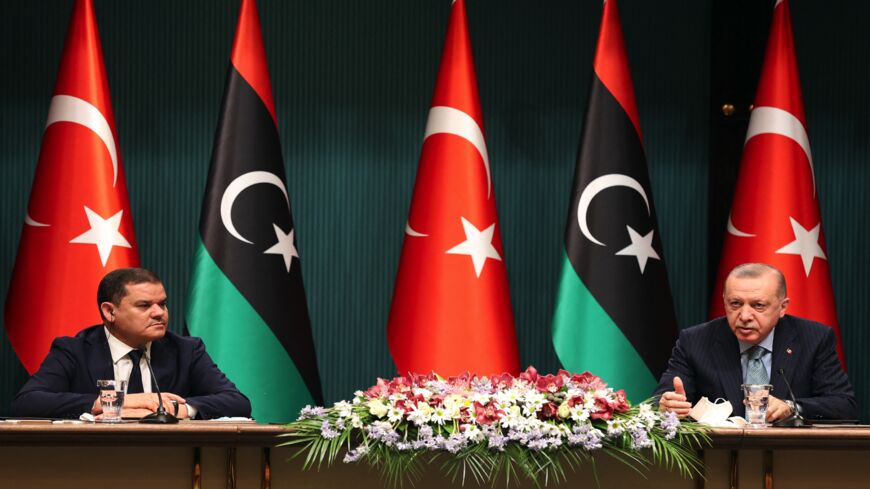« Turkey’s moves in Libya have undermined its fledgling dialogue with Egypt, even as Ankara took a number of measures to restrict Brotherhood exiles to please Cairo » reports Fehim Tastekin in Al-Monitor.
Turkey’s recent moves in Libya, including controversial new deals with Tripoli, have backfired on its fledgling bid to normalize ties with Egypt and gain leverage in energy disputes in the Eastern Mediterranean.
Egyptian Foreign Minister Sameh Shoukry said last week that dialogue with Ankara was halted after two rounds of exploratory talks because of “no changes in Turkey’s practices in Libya.” His remarks dampened Ankara’s prospects of a new chapter with Cairo atop its fence-mending with the United Arab Emirates, Saudi Arabia and Israel. Cairo is irked by Ankara’s signing of three new deals with the Tripoli-based interim government in October, including one on oil and gas exploration in the Eastern Mediterranean. The deals have angered also Libya’s eastern-based parliament, which disputes the legitimacy of Prime Minister Abdul Hamid Dbeibah and has approved an alternative premier.
Turkey was hoping that the talks with Egypt, chaired by deputy foreign ministers, would lead to a meeting between the two countries’ foreign ministers. Ankara was also changing its tone toward Egyptian President Abdel Fattah al-Sisi, replacing reproval with praise. Turkey’s charge d’affaires in Cairo told Egyptian media recently that Ankara “appreciates the impressive progress on the socio-economic development agenda in Egypt under [Sisi’s] leadership.”
Ankara also seemed to pay regard to Sisi’s sensitivities by restricting the activities of Muslim Brotherhood exiles in Turkey.
On Oct. 30, Asharq al-Awsat reported the Turkish police had detained 34 Brotherhood members, among them journalists, who called for anti-Sisi protests during the upcoming UN climate conference in Egypt. The detainees reportedly faced deportation on the grounds of endangering public order. Among them were allegedly individuals involved in efforts to revive pro-Brotherhood media in other countries, including Britain, after Turkey moved to restrict their activities last year.
On Oct. 28, a message posted from the Twitter account of Hossam al-Ghamri — the former editor-in-chief of al-Sharq, one of the TV channels that Turkey has curbed — said that Ghamri had been arrested and faced deportation. Brotherhood supporters launched a social media campaign urging Turkey to release the journalist. Finally, Ghamri tweeted on Oct. 30 that he had been freed.
Though Ankara has forced the suspension of programs hosted by vocal Sisi critics and shut down media outlets that defied the restrictions, its measures have yet to satisfy Cairo.
The detention claims, spread by Brotherhood-linked social media accounts, were apparently misleading. Turkish officials said that only one journalist was briefly detained and that Arab media often publish such allegations “to stir up trouble and make Muslim Brotherhood leaders in Turkey feel uncomfortable.”
This outlook might reinforce suspicions in Cairo that Turkey is playing a double game, but Libya seems to be Egypt’s priority condition for fence-mending with Turkey.
The energy exploration deal and the two military accords that Ankara signed with Tripoli last month were widely interpreted as Turkish support for Dbeibah in the row over his legitimacy. Cairo agrees with the argument that Dbeibah’s mandate ended in December 2021 when Libya planned to hold elections but failed, and it backs Fathi Bashagha, the premier approved by parliament earlier this year. In a gesture of protest showing that Cairo no longer recognizes Dbeibah’s government, Egypt’s foreign minister walked out from an Arab League meeting in September as the Libyan foreign minister began to chair the session.
The Egyptian support for Bashagha shows that considerations related to the Brotherhood are not the sole factor shaping Cairo’s attitudes. Sisi, for instance, has been eager to normalize ties with Qatar and draw Qatari investments, even though Doha has not pulled the plug on the Brotherhood.
In Libya, many Brotherhood leaders stand by Bashagha against Dbeibah. The Brotherhood had a central place in Turkey’s game in Libya until recently, but Ankara has come to realize that the Brotherhood channel would not guarantee its interests in the country.
Ankara tended to believe that Emirati money was the main driver of Egypt’s support for the eastern forces of Khalifa Hifter in Libya’s civil war. The UAE did finance Hifter but has stayed away from the forefront in Libya since Turkey helped Tripoli to break Hifter’s siege in 2019. Turkey has since normalized ties with the UAE, with Libya ceasing to be an issue of tension between the two countries. The support Bashagha receives from the Brotherhood is believed to have influenced the Emirati position.
The calculus underlying Ankara’s recent moves in Libya is that the Egyptian-Emirati partnership in Libya has unraveled and Cairo cannot insist on red lines as strongly as before without financial support. Furthermore, Ankara might be placing less importance on reconciliation with Cairo now that it has broken its diplomatic isolation by playing a mediator’s role in the wake of Russia’s invasion of Ukraine. All in all, Turkey feels free to move as it likes in Libya, playing ball with Russia on the one hand and getting tacit support from partners such as the United States and Britain on the other.
Still, Ankara could be miscalculating on Egypt. As Turkey seeks to expand its influence across North Africa, Cairo continues to see the Turkish military presence in Libya as a serious threat. According to Arab media, Sisi pressed hard for a condemnation of Turkey at the Nov. 1-2 Arab League summit in Algeria. The final communique stopped short of an open condemnation but rejected “foreign interference” in Arab affairs, which was widely seen as a reference to Turkey and Iran.
Also, Egypt remains aligned with Greece against Ankara’s maritime demarcation accord with Tripoli and the economic zone it claims in the Eastern Mediterranean.
Al-Monitor, November 3, 2022, Fehim Tastekin, Photo/Adem Altan/AFP

